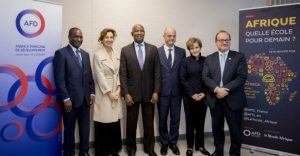UNESCO Director-General, Audrey Azoulay, advocated for education as a priority investment for sustainable development at a conference organized by the French Development Agency (AFD) in Paris.
During a round table with the Ministers of Education of Senegal, Serigne Mbaye Thiam, and France, Jean-Michel Blanquer, as well as the CEO of the Global Partnership for Education, Alice Patricia Albright, the Director-General outlined priorities to meet the challenges of educational access and quality in a region that still counts 32 million out-of-school children and faces advancing urbanization as well as conflict and crises situations.
To implement the 2030 Education Agenda, the Director-General outlined three priorities for Africa. First, the relevance of teaching and learning, right through to higher education. This involves adapting curricula and pedagogies, training teachers and drawing on new knowledge from the field of cognitive sciences.

The second priority is to better articulate education, health and employment policies, while the third priority focuses on the transmission of values for responsible citizenship and peace education. In this regard, the Director-General shared UNESCO’s initiative, led with with African Ministers of Education, to develop educational content based on the ten volumes of The General History of Africa.
In all of these dimensions, the Director-General stressed that priority attention should be given to gender equality, in particular to the education of young adolescent girls.
“The challenges are immense and we must all contribute through our mandates. UNESCO coordinates Sustainable Development Goal 4 and focuses on its added value: supporting public policies, sharing innovation and research, collecting statistical data and monitoring results,” concluded the Director-General.
The event, opened by the Director- General of the French Development Agency, Rémi Rioux, was held in preparation for the Global Partnership for Education’s Replenishment Conference, to be co-hosted by France and Senegal, in Dakar on 1 and 2 February, in which UNESCO will participate. This conference is a unique opportunity to increase international mobilization and aid to education, which has been steadily decreasing since 2009.


